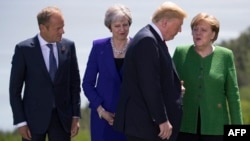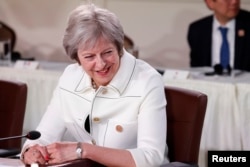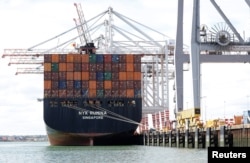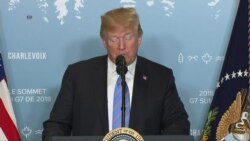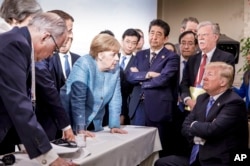The French and Canadians have been the fiercest in their reaction to last week’s acrimonious G-7 meeting, held in Charlevoix, Quebec, which broke up amid highly public and personal recriminations between U.S. President Donald Trump and fellow summiteers over trade tariffs.
But one summiteer was especially eager to keep a low profile.
Of all the G-7 leaders at the bruising summit, Britain’s Prime Minister Theresa May largely side-stepped the skirmishing.
May recorded her disappointment but avoided leveling personal criticism. “We had some difficult conversations and some strong debate,” she noted in a post-summit statement. She added the mild reproof, “It does not mean taking unilateral action against your partners.”
Britain’s ruling Conservatives — reassured by pro-Trump Brexiters, who bragged of their own special ideological ties to the U.S. President — had banked, privately and publicly, on pulling off a quick free trade deal with Washington. That would enable them to advertise the economic and political benefits of leaving the European Union and showcase how new opportunities for a “global Britain” would open up.
But now with the war drums of protectionism beating, and foreign leaders planning to punch back at Trump by slapping trade penalties on American goods in the coming weeks, Britain is being caught in the middle — and just as fears about Brexit are rising among ordinary Britons.
With a transatlantic trade war looming, British officials concede it is coming at a very bad time for Britain.
Despite the establishment in the U.S. Senate of a committee to examine the possibilities of a free-trade deal with Britain, earlier hopes of an easy or speedy agreement are looking gloomier with each passing day — and with every emerging transatlantic trade spate.
“With President Trump imposing tariffs on our steel, the delusion that his administration will come to our rescue shortly can now be laid to rest,” said Vince Cable, the leader of Britain’s Liberal Democrats and a former business minister. “The notion that a raft of new deals can be done swiftly or bring overall benefit to the UK economy has now been exposed as a fantasy,” he added.
May’s position is likely to become even more awkward in the coming days as she is forced into choosing to close ranks with European leaders, whose support she needs to seal a favorable Brexit deal, or a U.S. leader determined to re-define the trade and security relationship with Europe, fear British officials.
In an article in Britain’s Daily Telegraph Monday, a former Trump advisor, Sebastian Gorka, pointedly noted that Trump is “very loyal to those who are loyal to him and who share his goals and help him achieve them.” Gorka added darkly: The bad news? He is not a man to be crossed or tested. And he has a very long memory who fail him, or misrepresent themselves. Certain participants of last week’s G-7 summit meeting have learn that already — or very soon will.” In the article, written as primer for how to handle Trump on a planned visit to Britain next month, Gorka makes no mention of a free-trade deal with the U.S.
WATCH: President Trump on trade
The balancing act between an aggrieved Europe and a U.S. president adamant America’s Western allies are “robbing” the U.S. with predatory trade policies and under-paying for collective security may be impossible to maintain.
Some Brexiters fear escalating confrontation between the U.S. and Europe may have ended their chances of maneuvering Britain into a hard clean break with EU and that the transatlantic clash is strengthening their opponents’ case for Britain to secure post-Brexit membership of the EU’s customs union and even to stay within the Single Market.
“The Quebec G-7 is a reminder to Britain of many things: that trade is a multilateral not a bilateral issue, that the U.S. is not necessarily our reliable friend and that the great nations of Europe, of which Britain is one, share the same values and interests, “ Britain’s Guardian newspaper editorialized Monday.
British ministers are eager to try to defuse trade tensions. David Lidington, May's deputy, told the BBC: “I don't think a trade war does anybody any good. Everybody loses. So I think we need to work with the U.S. and with our European partners and other powers like Japan to try to find multilateral solutions to this because I believe that ordinary families benefit from free trade.”
But European diplomats say they expect the transatlantic clash triggered by Trump’s decision to impose tariffs on steel and aluminum imports will worsen. “We had hoped to de-escalate but the G-7 summit appears to have put paid to that,” a European diplomat told VOA.
“There will now be tit-for-tat retaliatory tariffs,” he said.
He noted that Germany, which has been cautious about retaliation, is now hardening its attitude, despite Trump’s Tweets Sunday renewing threats to raise tariffs on imported cars “flooding the U.S. market,” which would hurt Germany especially hard.
Diplomats say a trade war now clearly looms. Canada, Mexico, and the European Union have all pledged to slap penalties on billions of dollars of American goods, hoping that a slowdown in the U.S. economy and loss of American jobs will persuade Trump to change his mind.




